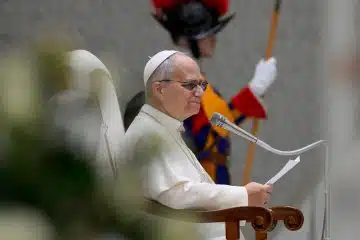Continence for the Kingdom of Heaven (Part 2)
Note: This article is part of an ongoing series on Pope St. John Paul II’s “Theology of the Body.
As we saw last month, Pope St. John Paul II taught that every human person “is called to love in his unified totality” (John Paul II, 1981, no. 11). Being created in the image of God, who is Eternal Love, our deepest fulfillment in this life is to make and live out a total gift of self. Such a total gift fulfills what the late pope called the “spousal meaning of the body” in his TOB reflections. He recognized that there are two states of life in the Church that most fully embody this total, spousal gift of self: marriage and continence for the Kingdom of God.
Continence for the kingdom takes many forms today, including the various forms of religious life (e.g., monks, nuns, sisters, brothers, consecrated virgins, etc.) and celibate priests. In each of these, men and women make solemn vows or promises to forgo earthly marriage and dedicate their lives wholly to Christ and the Church. Analogous to the bride and groom at a wedding, they make a total gift of self that is permanent and exclusive. The spousal gift in continence for the Kingdom, however, involves a renunciation of the joys and comforts that come from earthly marriage, most especially the gift of children.
By forgoing the bonds of matrimony and the gift of biological children, the man or woman who is totally consecrated to the Lord makes him or herself completely available to do the Lord’s will. Like Jesus’ disciples during his earthly ministry, they are available to follow the Lord wherever He goes and do whatever He calls them to do. Because of this, Catholic tradition has consistently thought of continence for the Kingdom as a higher calling than marriage:
“Virginity or celibacy… bears witness that the Kingdom of God and His justice is that pearl of great price which is preferred to every other value no matter how great… It is for this reason that the Church, throughout her history, has always defended the superiority of this charism to that of marriage, by reason of the wholly singular link which it has with the Kingdom of God” (John Paul II, 1981, no. 16).
An essential fruit of this radical availability to the Lord is an openness to care for all of humanity in a way that goes beyond what married people are able to do. Indeed, husbands and wives are first and foremost called to love and care for each other and for the children born of their love. This is proper to their vocation. Conversely, the vows of consecrated men and women do not bind them in the same way to a specific earthly
spouse and biological children, making them available to become mother and father, brother and sister to all. As Pope John Paul II wrote in his 1981 exhortation on the family, “In spite of having renounced physical fecundity, the celibate person becomes spiritually fruitful, the father and mother of many, cooperating in the realization of the family according to God’s plan” (no. 16).
Unfortunately, there has been a tendency at times among some Catholic authors to denigrate marriage in order to exalt continence for the Kingdom by comparison. Doing so distorts the Catholic vision of marriage and sexuality and also dims the splendor of continence for the Kingdom. After all, a sacrifice is most laudable only when it involves giving up something of great value. Thus, we behold the glory of continence for the Kingdom most clearly when we see it as a free surrendering of the great good of earthly marriage out of love for Christ and the Church. Indeed, time and time again, Pope St. John Paul II affirmed the holiness and beauty of marriage and family and simultaneously elevated the Church’s esteem of continence for the Kingdom:
“Virginity or celibacy for the sake of the Kingdom of God not only does not contradict the dignity of marriage but presupposes it and confirms it… When marriage is not esteemed, neither can consecrated virginity or celibacy exist; when human sexuality is not regarded as a great value given by the Creator, the renunciation of it for the sake of the Kingdom of Heaven loses its meaning” (no. 16).
We will continue to meditate on the nature and fruitfulness of this wonderful calling of continence for the Kingdom of God, next time.
 Dr. Andrew Sodegren, [email protected], is a Catholic psychologist and director of psychological services for Ruah Woods. He speaks on the integration of psychology and the Catholic faith. He and his wife, Ellie, have five children.
Dr. Andrew Sodegren, [email protected], is a Catholic psychologist and director of psychological services for Ruah Woods. He speaks on the integration of psychology and the Catholic faith. He and his wife, Ellie, have five children.
This article appeared in the May 2025 edition of The Catholic Telegraph Magazine. For your complimentary subscription, click here.














